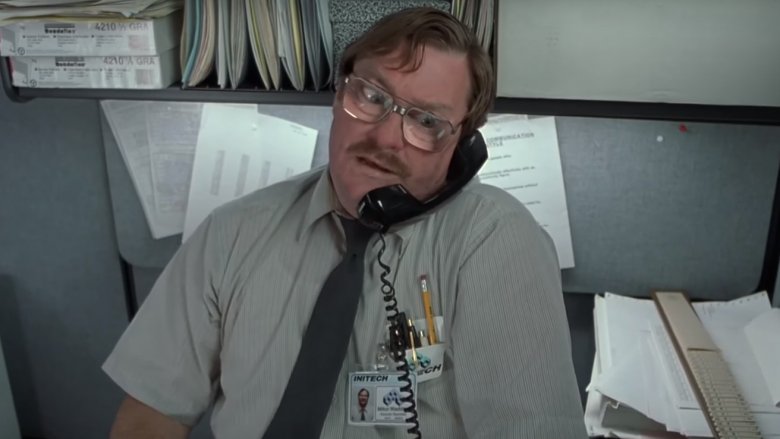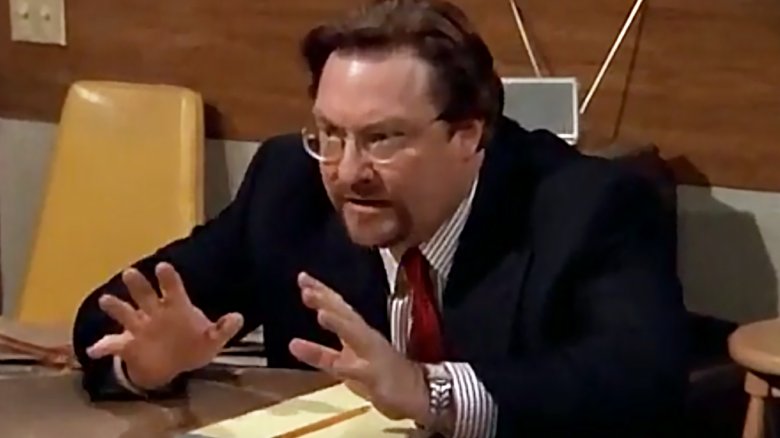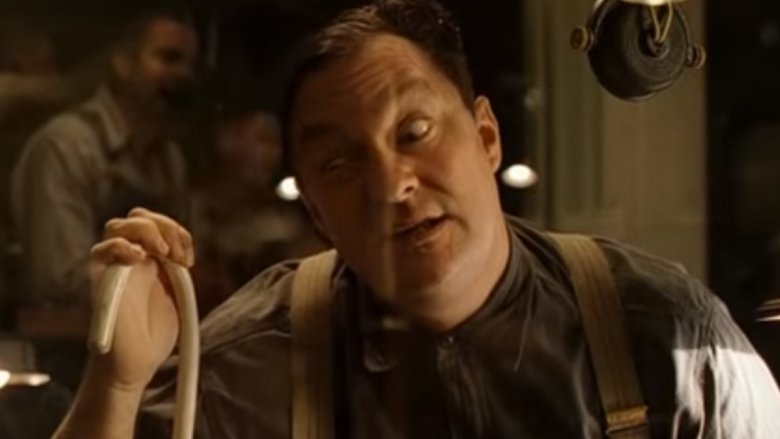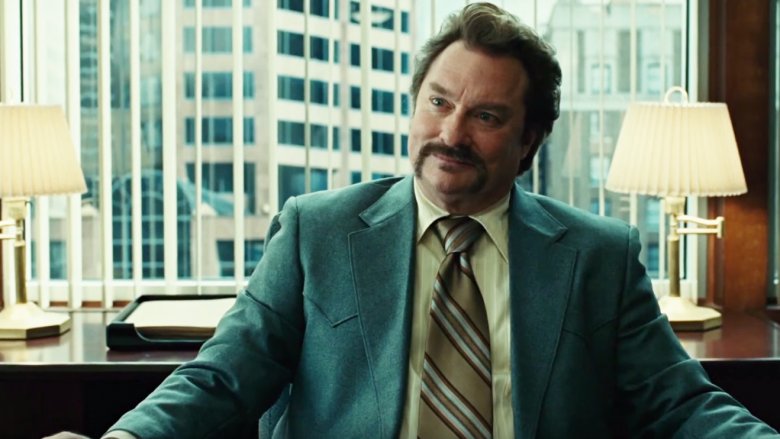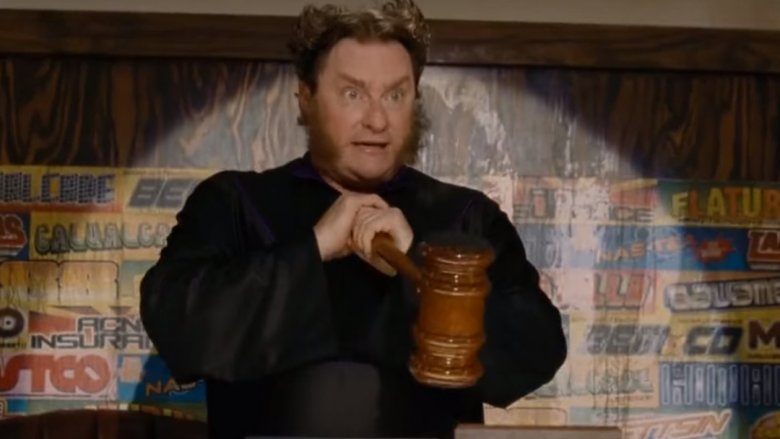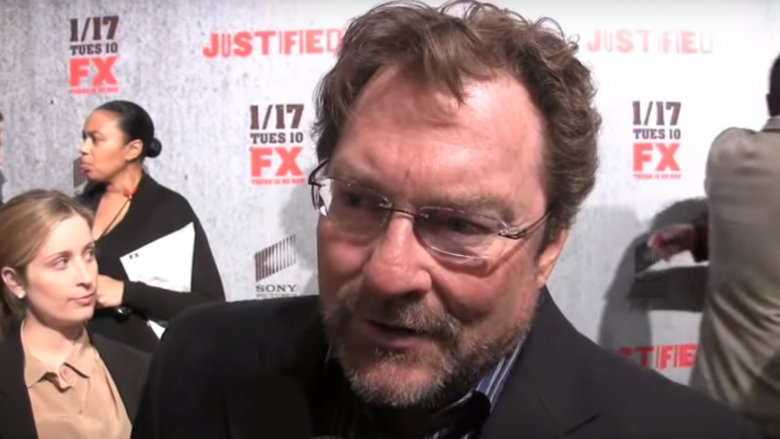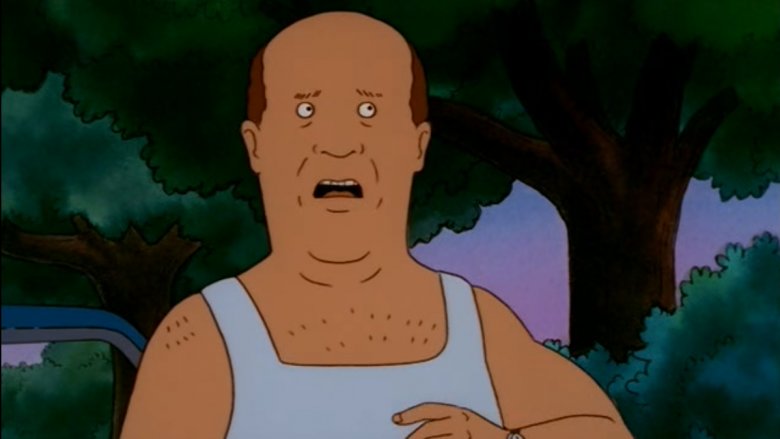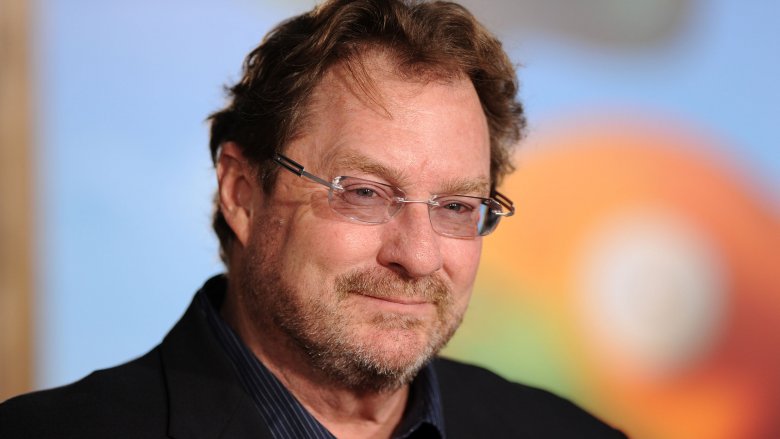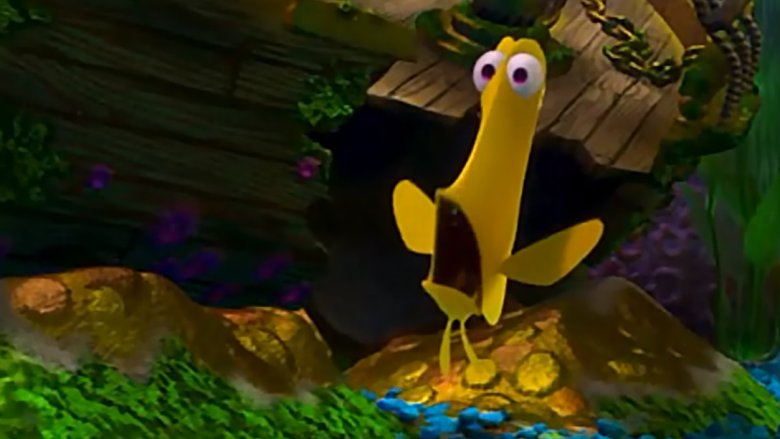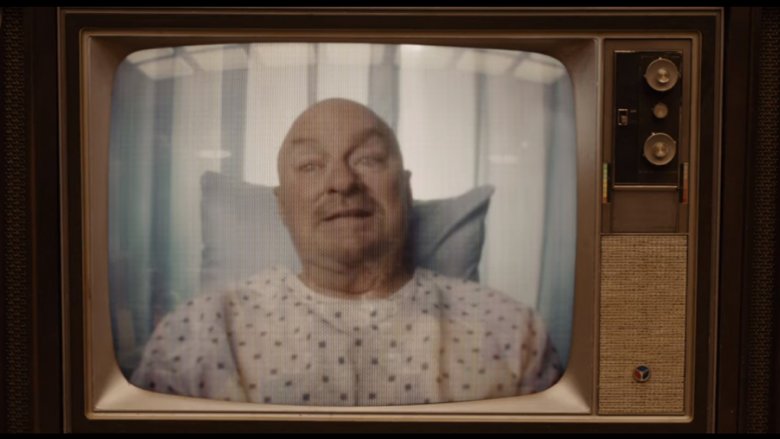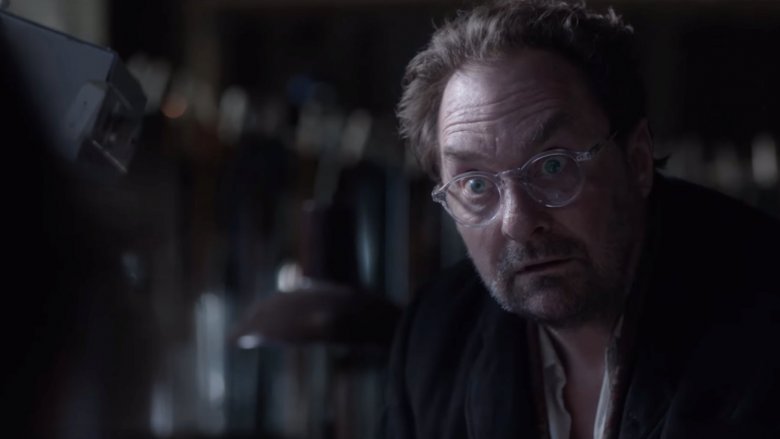Whatever Happened To Milton From Office Space?
While for 13 seasons, Stephen Root provided the voice for luckless Bill Dauterive in Mike Judge's animated television series King of the Hill, it was as another Judge creation — nerdy, stapler-coveting cubicle dweller Milton Waddams in the 1999 cult classic Office Space — that gave Root his first truly iconic character. In fact, it's a role that still resonates with movie fans and corporate denizens today. "When I did a [theater] show in New York," Root told the New York Times, "I would have Milton people outside for a least a couple days a week. I've gone on to sets before, and there's a tray of staplers waiting for me. I'm so happy that it's a little movie that resonates with people. There are always going to be cubicles. The computers will change, but it's the same mentality."
One of our finest character actors, Root has a face most recognize, but a name few keep on the tips of their tongues. He doesn't win awards or get starring roles — he simply holds scenes together, stealing them on occasion. He's been a Klingon, a vampire, various law enforcement officials, a fish, J. Edgar Hoover, and even Santa Claus. With a list of roles a mile long and a career of over three decades, he's done just about everything, moving from film to television to the stage with ease. But it's Milton that people remember best. What has Stephen Root been up to since that pivotal role?
Before he was Milton, he was Jimmy James
Before he became Milton, Root spent five seasons playing Jimmy James, micromanaging billionaire owner of radio station WNYX, on NBC's NewsRadio. The show was a critical success and a hit with its fans, but never a ratings bonanza. Still, who among the show's devoted coterie of regular viewers could forget Jimmy's rant on free advertising ("That's something you just can't buy") or his unique "opening move" in a negotiation (slamming his shoe on the table and shouting "I will bury you!")? The key to the show's success, though, was not any one single performance, but the work of an ensemble that included Dave Foley, Maura Tierney, and the late Phil Hartman. "Everybody's on the same comedy wavelength here," Root told the LA Times at the time. "We're trying to create a classic show."
By and large, they succeeded. "It wasn't like, let's be revolutionary. It's just what it was," Root told Uproxx for an oral history on the show. "It was smart and funny. We had the same senses of humor." Root looked very close to home to help him create the character of Jimmy James. "I kind of based my character on a little bit of my dad," he told Uproxx. "When that character started out, you didn't know if he was really smart or really dumb, and it was kept kind of on the cusp there ... And that's what I wanted to play. I didn't want to play some kind of stodgy station owner who was the dumb boss."
After Office Space, he was still a radio man
A year after NewsRadio was cancelled and Office Space was in theaters, Root once again played a character involved in radio, as Mr. Lund, the blind radio station manager in a pivotal sequence in Joel and Ethan Cohen's O Brother, Where Art Thou? In Root's first scene, George Clooney's Ulysses Everett McGill, his fellow chain gang escapees (played by John Turturro and Tim Blake Nelson), and a guitarist they've picked up on their adventures, travel to radio station WEZY — literally a radio tower in the middle of a field — where Root's Mr. Lund serves as "honcho." McGill says he's heard Lund will "pay good money to sing into a can."
That sets up the recording session that results in McGill and his cronies — dubbed The Soggy Bottom Boys — record the traditional folk song "Man of Constant Sorrow." As they perform, the camera moves between the quartet playing and Mr. Lund in the production booth, in obvious thrall of the harmonies, swaying and mouthing the words. Sometime after the session, after the song has become a hit, Mr. Lund is visited by a record promoter looking for The Soggy Bottom Boys, to sign them to a contract "before the competition does." In the small but memorable role, Root makes a definite impression.
He loves working with the Coen brothers
The Coen brothers have often worked with actors in multiple films — Frances McDormand (Blood Simple, Raising Arizona, Miller's Crossing, Fargo) comes to mind, as do John Turturro (Barton Fink, The Big Lebowski, O Brother, Where Art Thou?), John Goodman (Raising Arizona, Barton Fink, The Big Lebowski), George Clooney (O Brother, Where Art Thou?, Intolerable Cruelty, Burn After Reading) and others. Add Stephen Root to that list — though his roles have never been that large, his performances are always stand-outs.
In addition to playing Mr. Lund in O Brother, Where Art Thou?, Root served the Coens in The Ladykillers (2004) as Mr. Gudge, the manager of the Bandit Queen Casino, the target of a heist attempt by a group of thieves led by Tom Hanks' Goldthwaite Higginson Dorr, an Edgar Allan Poe-quoting, smooth-talking criminal. Gudge's firing of the group's "inside man" (a janitor, played by Marlon Wayans) sets off the conflicts that drive the film. Root also makes a mark in No Country for Old Men (2007), as a crooked businessman who hires hitman/day-trader Carson Wells (Woody Harrelson) to kill Javier Bardem's even-crazier hitman Anton Chigurh. Root's performance is all cool detachment — all business, as befitting a man in the deep trouble in which he finds himself.
He's a go-to actor in over-the-top comedies
Root's versatility as a character actor helps him score roles in dramatic films and television series, and also makes him an in-demand actor for comedic roles. For example, his King of the Hill and Office Space connection to Mike Judge doubtless helped him score the role of Judge Hector "The Hangman" in Judge's dystopian farce Idiocracy (2016). Certainly, the courtroom scene over which Judge Hector presides has to be one of the most chaotic ever committed to film. In the Vince Vaughn/Ben Stiller vehicle Dodgeball: A True Underdog Story (2004), Root plays Gordon Pibb, hapless but good-hearted patron of Vaughn's second-rate gym. In Mike and Dave Need Wedding Dates (2016), he's the father of the two title characters, who advertise their need for dates to their sister's Hawaiian wedding.
In interviews, Root has given behind-the-scenes glimpses of working on these comedies. For example, his role in Dodgeball required real preparation ... playing dodgeball. "We'd all get in a line," he told one interviewer, "and someone would throw balls at us, and we'd learn specific ways to dodge [them]." Mike and Dave's production shot on location in Hawaii, which was just fine with Root. "My favorite experience working here is that you feel like you're on vacation part of the time," he told another interviewer. "When you're off for a weekend, you can go paddle boarding; you can go watching the sharks. You can delude yourself for a couple days and then go, 'Oh! Gotta go to work again tomorrow!'"
He has a thing for playing judges
In addition to his raucous turn as Judge Hector "The Hangman" in Idiocracy, Root has availed himself of the opportunity to preside over several other onscreen court cases. In the 2010 pilot episode of the short-lived drama series The Defenders, he played Judge Taylor, adjudicating a murder case. Over six seasons of the series Justified, he played the hard-as-nails judge Mike "The Hammer" Reardon. On The Good Wife, he twice played Judge Murphy Wicks, the "downstate hick," according to a Wall Street Journal recap, "assigned to [the episode's central] case. 'Just call me Murph,' he tells the lawyers.'" Most recently, Root took on the role of Judge Walsh in the award-winning HBO series Veep.
Playing characters with so many variations of the same occupation might give some actors pause when starting a new role, something even an actor as accomplished as Root acknowledges. "Every first day of a new project is always very, very crazy for me," he acknowledged to Backstage. "It's just being the new kid at school: The first day of any project has always been hard for me. I've learned to deal with it, but it's always the same, and it doesn't matter if you've worked with the people before. It's a new situation, a new role, a new slate. And then you do one scene, or one rehearsal, and then you're fine."
You know his voice … or voices
Root has lent his voice to dozens of animated television, film, and video game projects, starting with his role on King of the Hill. "I was lucky enough to break into [voice acting] with Mike Judge's stuff," he told the Voice Coaches podcast. "That really opened the door to other films. Once you've done three or four and you're known as an actor in the business anyway, that breaks down the door and you can start getting offers for smaller things, like Saturday afternoon cartoon stuff."
Root notes that acting for the camera and just for the microphone are remarkably similar. "It's not really that different," he told Voice Coaches. "You're not separating your head from your body when you act; you're still doing the character with your whole body. [The audience is] just not seeing it. It's essentially the same process — figuring out what you would do with this guy and having a director direct you." He also notes that his approach to a role is still character-centered, even if he's not acting with an audience or camera in front of him. "You're still doing the character; you just have to be seated and have less motion — or whatever, however you do it," he told Backstage. "I stand up and do mine. I feel like you have to commit to being that character, no matter what it is. And you can't just limit that to your head and your throat."
He played a cartoon trio in Rango
Root's voice acting skills were put to the test in the 2011 animated feature Rango, in which he played three different characters: a jackrabbit named Doc, chipmunk banker Merrimac, and a porcupine named Mr. Snuggles. The tale of a pet chameleon (voiced by Johnny Depp) who becomes stranded in an Old West town called Dirt, Rango won the Academy Award for Best Animated Feature and earned a global gross of nearly $247 million (about half that from domestic audiences).
Root was interested in doing the film in part because of the many layers of storytelling that run through it. "I think the movie was very adult-centric, like a lot of the best Pixar stuff," he told Bullz-eye.com. "I think it plays on a 10-year-old level, but I think it also plays on an adult level as well, which will make it timeless."
The process of recording the voices in the film was different from most animated movies, in which voice actors record parts and animators animate independently. "We shot the whole thing on a soundstage at Warner Brothers," Root told Bullz-eye.com. "They actually filmed us, in rehearsal clothes and using rehearsal props. But we were all doing the scenes together, which was great. So then the animators could take that film, look at our body movements and our expressions, and then animate from there. They didn't necessarily take the exact camera angles that we shot, because it was gonzo theater ... [but] it was fun for us."
He's Nemo and Dory's friend, Bubbles
While King of the Hill was not exactly the kind of animation parents would put their kids in front of during TV time, it did expose Root to a whole new avenue for his talent, as he noted to the Voice Coaches podcast. One of the roles he landed as a result was that of Bubbles, an excitable yellow fish, in the Pixar classic Finding Nemo (2003) and its sequel, Finding Dory (2016). Together, the films earned nearly $2 billion in worldwide gross (around $850 million in the U.S. alone), without question the biggest hits with which Root has been associated.
Bubbles is noted for his energy and for giving his full attention to ... well, bubbles, as well as anything else that strikes his fancy. "Bubbles is very excited about everything," Root explained at Finding Nemo's premiere. As part of the extensive commercial offshoots from the films, Root's character was featured in toys, on lunch boxes, and even a Finding Nemo video game, to which Root contributed his voice as the friendly, excitable fish.
He loses his head in Get Out
Shot in just 23 days on a budget of $4.5 million (according to Vulture), the horror film Get Out was comedian Jordan Peele's feature film debut as a director, and it featured Root in one of his most harrowing roles. In the film, a young white woman takes her black boyfriend (played by Daniel Kaluuya) to her parents' estate in the country, where the family and their friends intend to replace his brain with that of an older white person. Root's character, the blind art dealer Jim Hudson, wins an auction to have his brain used in the procedure, and, in a truly creepy scene, he explains the transplantation process to Kaluuya's character over a video link into an old TV. "I want your eye, man," Hudson says to conclude the conversation. "I want those things you see through." And, of course, since this is a scary movie, we later get to see Hudson's portion of the transplant operation, in all its bloody glory.
The racial subtext and high anxiety of the story, coupled with the fine work of the cast, yielded a true rarity in Hollywood — a horror film nominated for a Best Picture Oscar. With a domestic box office gross of more than $176 million, it was also a massive hit. Root had nothing but praise for its director. "It's so well directed and so well written," he said in one interview. "And it's something that Jordan's been working on for a long time, and it came to fruition."
He's the Man in the High Castle
The Amazon series The Man in the High Castle is the film version of Philip K. Dick's alternative history of post-World War II America that answers the question, "What if the Axis had won?" In the series, Root plays Hawthorne Abendsen — the actual Man in the High Castle — the collector and possible creator of a series of films containing alternate versions of historical events, films that are forbidden by the Nazi government. Root's involvement in the series is due in part to his satisfaction with the story and the personnel involved. "What makes me happy these days is to do good scripts and work with good people on a cool project," he noted at the series' Season 2 premiere. "I don't have to make gold out of straw, because it's already gold."
His interest also stemmed from a long-time love of the genre. "I'm a big sci-fi guy from way back," Root told Entertainment Weekly. "Back in the '70s, I was getting out of high school and going into college, I was well into [Robert A.] Heinlein and Arthur C. Clarke, and A. E. Van Vogt, and of course [Philip K. Dick]." Of his character in The Man in the High Castle, Root says, "He's an enigma. I felt like, although this character could be either a madman, or somebody not from this dimension, or many different possibilities, I think the basic fundamentals of the man had to be loyalty and groundedness. Some core of the man is truthful."
